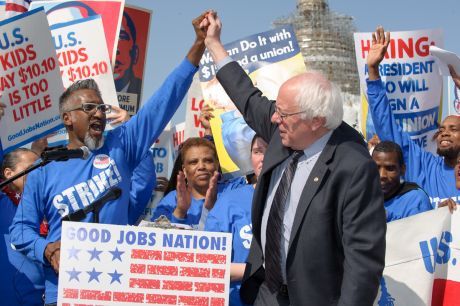Features
You are here
Bernie Sanders: a “socialist” candidate for a corporate party

August 19, 2015
Amidst widespread anger against inequality, racism and a climate crisis, the self-described “socialist” Bernie Sanders is running for President of the US.
Mood for change
Sanders appears as a radical and his language is in tune with the hopes of millions across America. Sanders wants a living wage, childcare, universal single-payer healthcare, guaranteed sick and vacation leave, free university education, a progressive income tax to indirectly redistribute wealth and laws to stop corporate tax evasion. Sanders is one of the few politicians who have even mentioned the “free trade” Transatlantic Trade and Investment Partnership.
That these demands have a wide audience shows the mood for change. His candidacy opens an exciting window for the next 12 months, which could make the start of the Presidential campaign a real debate on the issues facing the 99% and the need for real alternatives.
It should also be a lesson for the NDP that campaigning to the left can mobilize broad numbers, including all those disillusioned with mainstream politics. If he can pack stadiums on a call for political revolution and taxing the rich, why is Mulcair still supporting the tar sands expansion and timid about taxing the rich?
Democrat spoilers
But Sanders risks spoiling the ballots of all those his campaign is inspiring. Despite his radical rhetoric, Sanders is not running as an Independent but for the Democratic Party—the twin party of American capitalism.
Even if he were to win, exactly who is Sanders intending to lead as president and who would pass his proposed legislation? Presidents do not make law. The party is fully disciplined and corporate-owned and operated. This would be a repeat of the 2008 campaign where Obama came from behind to beat Clinton, riding on the wave of the anti-war movement and the beginnings of the anger over the economic crisis—with the slogan “Change we can believe in.” Despite his historical achievement (which Sanders lacks) as Black president, Obama has been the figurehead for the same old corporate policies—surveillance, torture, drones, warfare, racism, and climate crisis. It’s movements against these—Occupy, Black Lives Matter, Fight for $15—that have created an audience for Sanders, but he wants to direct these right back into the same corporate party.
The more likely option is that Sanders will lose to Team Hilary Clinton, which has spent years preparing. Clinton is immeasurably ahead with the giant donors and lobbyists and as the race progresses the disparity will grow. The Democratic Party establishment are with Clinton and will not jeopardize their corporate funding. But what will compound that electoral loss is Sanders’s political strategy of supporting the Democratic candidate. After a year of raising hopes of an alternative to Clinton and the Democrats, he will deliver his voters into their embrace. Sanders claims that “I will not be a spoiler. I will not play that role in helping to elect some right-wing Republican as president of the United States.” This was the insult hurled at Ralph Nader’s campaign in 2000 for allegedly allowing George Bush to win. But Nader’s campaign surged in the wake of the 1999 anti-globalization movement, exposing the corporate duopoly that rules America and raising the hopes for an alternative.
Refusing to build an alternative to the Democrats means acting as their left flank, and becoming a safety valve for working class discontent—which has a long history. In the 1984 and 1988 primaries Jesse Jackson inspired millions and caused a panic within the Democrats and the wider establishment, and when he lost the primary his campaign disappeared into the party. In 2004 Howard Dean paid lip service to the anti-war movement and pulled it into supporting the Democrats, whose candidate John Kerry tried to be more pro-war than Bush. Dennis Kucinich has for years combined radical rhetoric with support for a party that undermines it.
Sanders’ contradictory strategy highlights the contradictions of his own voting record. He followed Bill Clinton’s lead in 1999 without qualms about NATO bombers splintering Yugoslavia. In September 2001 voted for George Bush’s invasion and occupation of Afghanistan. Sanders voted against invading Iraq in 2003 but then voted for funding this war and that in Afghanistan. Even as Israel was killing Palestinians last year, Sanders supported the resolution promising unconditional support for Israel. Likewise, Sanders has had no problem with Israel’s land-grab of Palestinian land in the West Bank, Israel’s nuclear arsenal, the periodic bombing of Lebanon or the annual flow of billions of dollars from the U.S. taxpayer to Israel. To his credit, Sanders opposed the original Patriot Act, but in 2006 supported making the then remaining version of the Act permanent and increasing FBI surveillance power. He also has little to say about fighting police racism and anti-black racism, which has sparked protests by Black Lives Matter.
Alternative
These interventions show what’s possible over the next year, where movements can make use of the space he is creating for discussion and push for broader and more radical politics—including challenging the Democrats and his strategy of supporting them.
Resistance movements don’t have to pour themselves into corporate parties but can give rise to alternatives. In 2013 the socialist Kshama Sawant defeated an incumbent Democrat to become a Seattle City councilor, by campaigning to raise the minimum wage to $15/hr. Not only did she win the election but she has subsequently used her position as a megaphone for the movements.
If Sanders adopted that strategy he could continue creating a space for radical politics beyond the Democratic Convention, regardless of who is elected nominee. Even if he refuses to do this, the intervention of movement activists in the next year could create a poll of attraction to build an anti-capitalist alternative outside the corporate Democratic party.
Section:










